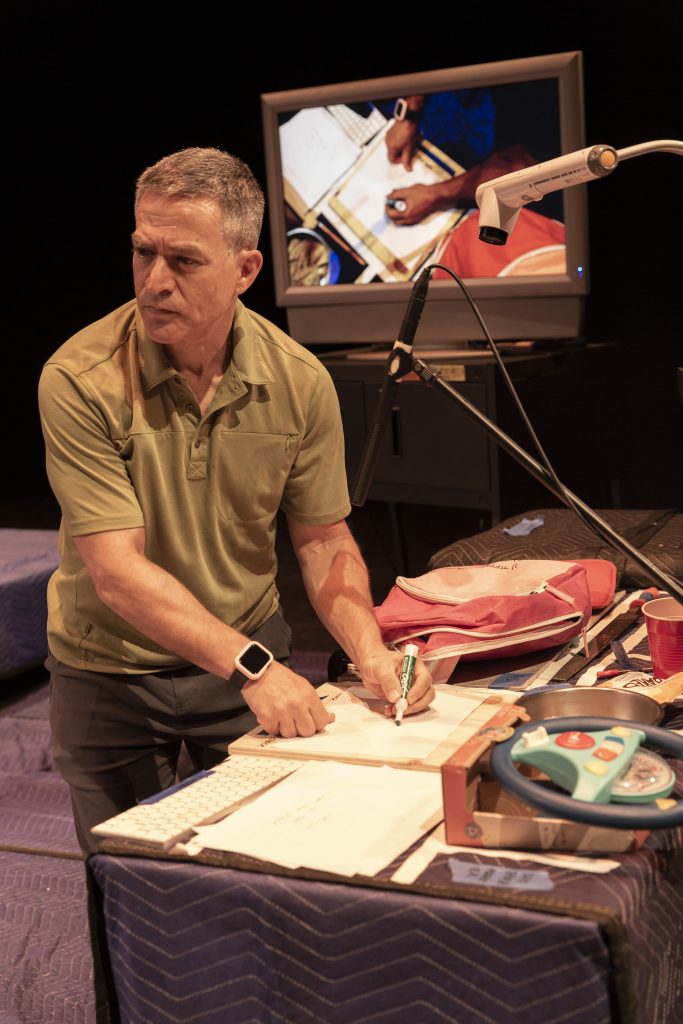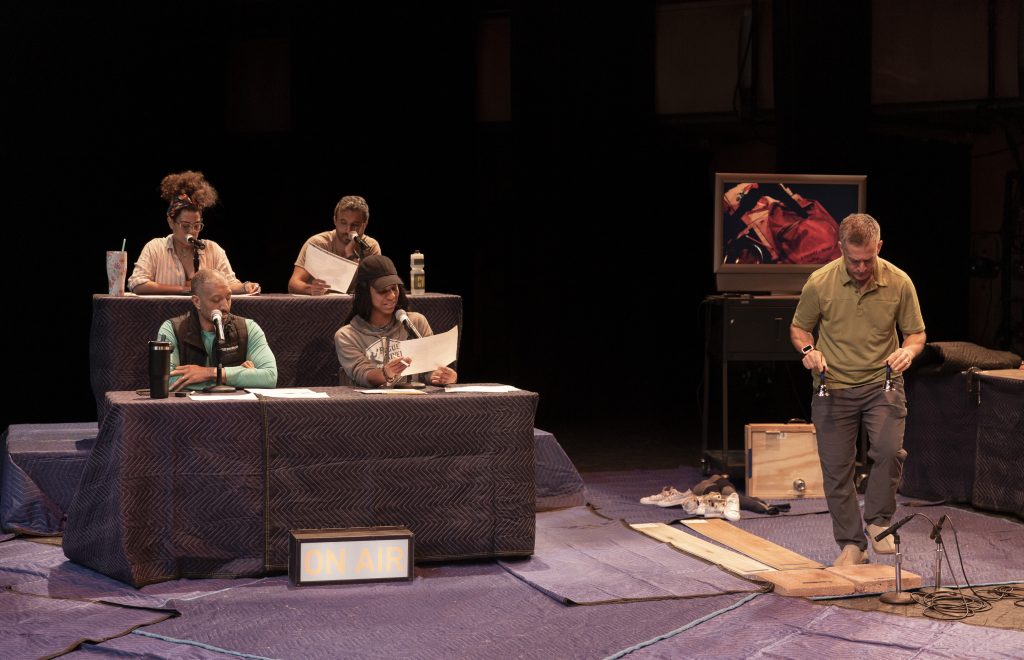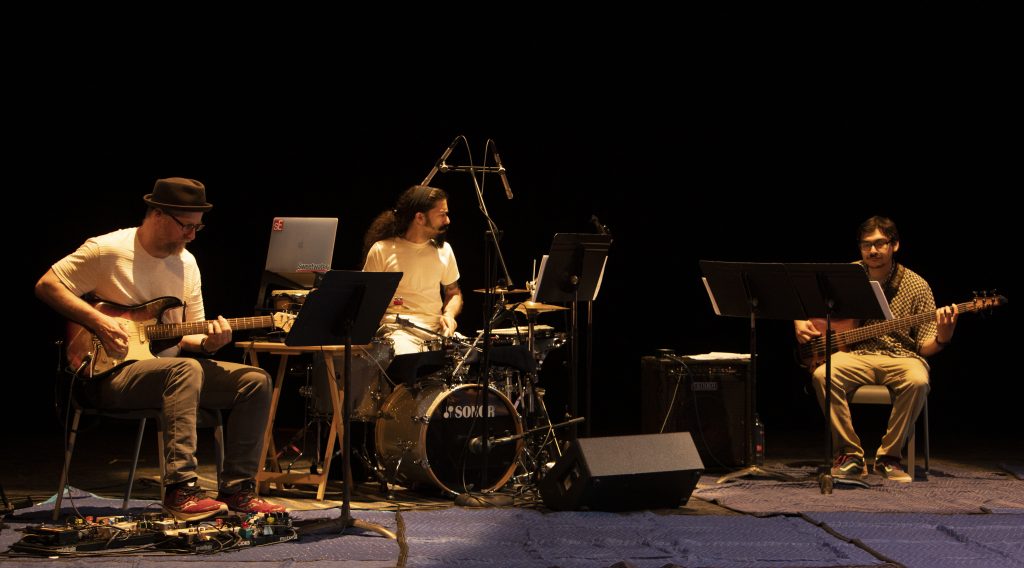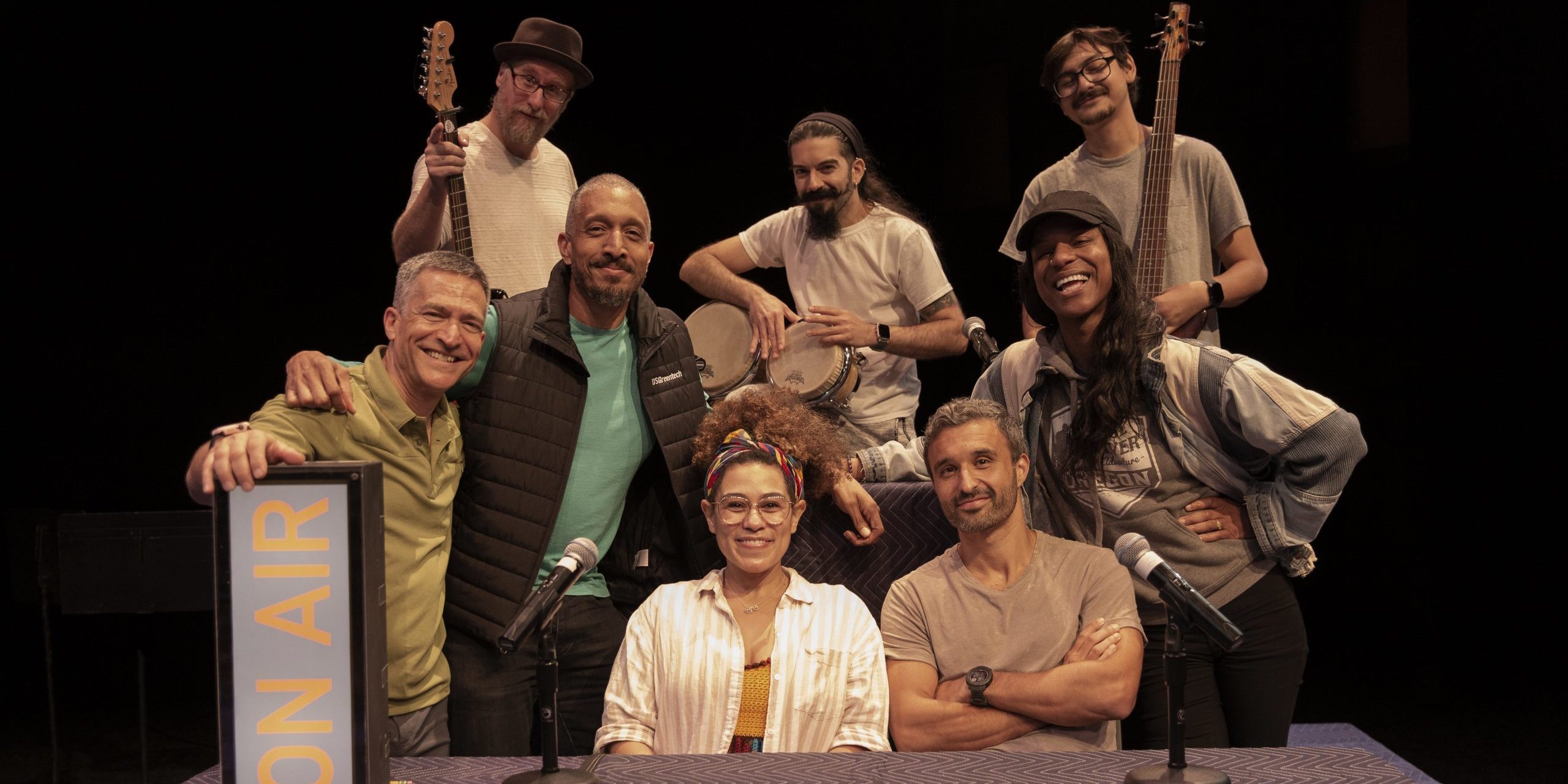Written by Lily Stockton
Dan Froot and Company is a collective theatre ensemble actively answering pressing sociopolitical questions. Their current project, Arms Around America, is a constellation of short plays about families whose lives have been shaped by guns. The project aims to engage audience members in a larger discussion surrounding not only what guns do, but what guns mean. The narratives presented blur the binary between pro- and anti- gun, encouraging viewers to expand their understanding of the full political spectrum. The multidisciplinary performance facilitates dialogue, challenges your imagination, and provides new commentary on old issues. Guns in America are a complex topic that cannot be summed up in a night, but Dan Froot and Company does a damn good job at cracking open the conversation.
Interview has been edited for clarity and brevity purposes.

LILY STOCKTON: Who are you? Where do you come from; where are you going?
DAN FROOT: Well, my name is Dan Froot. I’m a performance artist. I lived about half my life on the East Coast in New York City’s downtown dance and theater community. I came out to Los Angeles in the mid-nineties, was bicoastal for about five years, and then started living here full time in 2000. And I was a [WAC/D] professor at UCLA from 2000 to 2024.
L: Amazing! Can you describe Arms Around America in one word?
D: Dialogue.
L: For the people that aren’t familiar with Dan Froot & Company, could you give us some background on your journey and how Arms Around America came to fruition?
D: Dan Froot & Company came about through years and years of relationships—building pieces from long form oral histories shared with me while volunteering on food lines and soup kitchens from people who were living with food insecurity or homelessness or living in shelters. For years, I collaborated with a puppet-theater artist friend of mine named Dan Hurlin. Together, we made several adult puppet shows based on the oral histories of people from the food insecure community. We did that from about 2005 to 2018.
D: Our first radio show, which premiered in 2017, was called Pang! I decided I wanted to work with audio dramas because it places the audience in an empathetic position to imagine the scenario. The only sense they have to work with is their sense of hearing. There’s a gap between what they’re seeing and the sound world. People are hearing a family in their living room on a Sunday morning, but they’re seeing three actors with music stands and me walking around a piece of plywood. That gap is where the audiences’ imaginations actually create the play.

L: The live radio broadcast is very unique and not a genre many artists experiment with. How do you think the format influences the audience’s encounter with the content? Do you find the subject matter is more digestible in this format?
D: A lot of people aren’t really sure what the show is when they come. Like you said, not a lot of people have experienced something like this; but audiences quickly become engaged and delighted in the format. It really seems like magic when all of these disparate elements come together in a sound world. I think one of the reasons people really respond is because they have the freedom to exercise their imagination. They don’t see the characters from us. We aren’t embodying them, we’re just voicing them. It’s been a really great way for us to engage the audience and embody that word you asked for earlier: dialogue.
L: What’s the biggest misunderstanding or misinterpretation of the show that you want to debunk?
D: The first thing is to dispel the idea that, because the show is about our relationships with guns in the U.S., it is somehow ultra serious and heavy. We work in a trauma informed way. We don’t recreate any kind of violence or gunshots. Guns are not necessarily about guns. Guns mean different things to different people. That’s one of the things we’re exploring with this piece.
“It’s not really about guns. It’s about people.”
Dan Froot
L: Did you intend for this show to premiere after the election?
D: No I did not plan it that way *laughs*
L: Okay, good to know. I’m wondering if or how your intention and message behind the show has shifted in the past week? And how you’re treating these kinds of conversations and dialogue?
D: Our group has been working together for years and there’s a real tightness to our kind of family bond. A lot of people are parents of young children; working really hard to make a living; in difficult personal circumstances; and what ends up happening in rehearsal is some kind of magic occurs where we transport ourselves into the questions being asked by each of the plays. In doing that, and in trying to be responsible to each other, we as an ensemble find the search for understanding to be healing and protective of our humanity. We’re hoping the audience can feel the same way. We’ve been hoping that all along. The way the election turned out in the immediate aftermath doesn’t seem like there is a call for violence—that was something we were really afraid of. What feels to us most important is to come together in community, likeminded or not. We’re hoping to extend that magic to everyone who comes to The Nimoy.
“This piece calls upon people from different information bubbles and belief systems to come together in dialogue.”
Dan Froot
L: It’s really important that you get perspectives from all sides of the spectrum when discussing topics like gun violence. I admire how you made that effort and wondered if you could expand on the steps you took to prioritize not looking at the guns and focusing on the people?
D: I think it’s fair to say that regardless of where you stand on gun ownership, the floor is that we all don’t want gun violence. We work in long form oral history in order to get as detailed and wide ranging a picture of each narrator as possible. The more you talk to people, the more nuances you find in their position on anything. You come to know these narrators, even when you learn they shot someone and never got caught, I find myself still loving them. I never thought that that would be possible in my life. A lot of our community partnerships just happened to come about. We told them we were looking for participants from very diverse backgrounds. Those partners took that to heart and brought us people who had very nuanced relationships with guns. I’m tempted to tell each person’s story right now; no one has a cut and dry, one-dimensional story about guns.

L: Yeah. I think that’s what makes the show so compelling though. None of the narratives are the same.
D: Yes and hopefully those stories come into conversation with one another. We have stories of a happy hunter and then two brothers who have no choice but to carry guns with them. Those stories speak to each other as uniquely American experiences based in racism, classism, and social stratification; they tell us so much about the different ways one can be American.
L: The emphasis on anti gun-violence is really important too. As a Texan, I understand guns can be a very personal thing. I think a lot of people jump to the conclusion, ‘Oh you want to take my gun? No.’ But this isn’t about that.
D: Right.
L: Last question, is where do you hope Arms Around America goes….aside from on tour?
D: Well, we have a companion podcast for the live show. I’m really interested in the ways those two can combine together. I’m hoping people who come see the show use the podcast as a way to introduce themselves to the format and the ideas; and vice versa. I’m also interested to see how far we can go with the idea that the audience can be like a town square and a community forum where people can really listen to each other. And hopefully we can model ways to have a civil civic dialogue where we learn to listen before we speak and we’re not trying to win. Our dialogues can ripple out from the theater into our communities—that is the highest calling of this work.
L: That’s amazing. Those are all my questions, but if you have anything you’d like the people to know, the floor is yours.
D: I would only add that if you don’t know what an audio drama or radio play is, or you don’t want to see something organized around the idea of guns, you’ll be pleasantly surprised if you show up. A lot of people find the format delightful, warm, intelligent, and humorous. These are engaging human stories. It’s not the kind of political theater that asks you to take your medicine.
“This is an opportunity to be in dialogue with other people’s stories and maybe even share your own.”
Dan Froot
Arms Around America premieres at The Nimoy Theatre on November 15th and 16th, 2024.
Reserve your seats HERE



